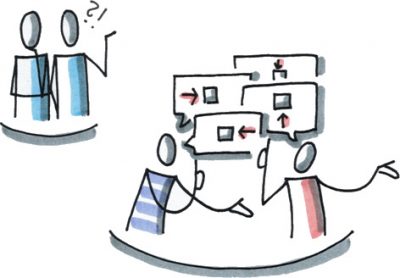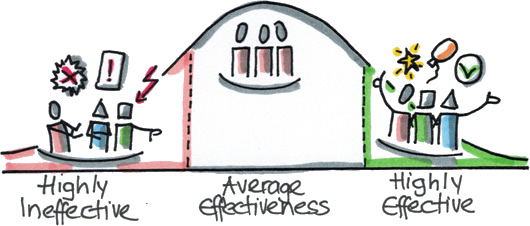The added value of culturally diverse teams
Diverse and multicultural teams can drive innovation and creativity. Likewise, culture specific knowledge within a team may contribute to a more adaptable range of products and services in international markets. Studies have also shown that diverse teams have the potential to be more productive and perform better than homogenous teams. This is provided that the necessary time and space is given for all to become aware of what each member brings to the table. In this way, the whole team can agree together on how to best work creatively and harmoniously together. Otherwise, miscommunication, distrust (perhaps based on stereotypes), lack of cohesion, stress, and reduced efficiency can become the norm, resulting instead in a painful cacophony.
“We all like diversity as long as everyone acts like us.”
– Howard Phillips

I went to the USA to participate to a two-week long training seminar. The class consisted of Americans from all around the country, and one other Swiss person from my hometown; what a very small world!
One evening, we were given a group assignment to come up with a case study to work on the next morning. Our instructions were “agree upon a client group you imagine to work with, define the challenges the group might have, and discuss what the work objectives could be.” We started discussing possible scenarios, reflected on different population groups we could/should/wouldn’t include, analyzed the impact that group size and composition could have on the objectives and outcome, difficulties that might arise, etc. Suddenly, my Swiss colleague and I looked up, and we realized that the rest of the group had gone silent for a while. They watched us as we intensely discussed these matters, looking at every single aspect in detail, and making sure that we hadn’t missed any major point. After a few seconds of awkward silence, one of the American participants burst laughing and said, “Now I understand why it can be so challenging to work with some of my European colleagues – you tend to over-analyze things. Let’s go for the big picture; we can change things tomorrow morning if necessary”.
Analytical and pragmatic styles
Differences in decision-making, project management, and reasoning styles impact multicultural teams.
- From my Swiss perspective, attention to detail and doing things right the first time are important. This often requires a slow decision-making process and long-term planning. When something has been decided, it is assumed to be definite.
- North American cultures tend to be more pragmatic and action-oriented. Delivery and efficiency are more important than high quality. Thus, initial plans can be modified along the way, and changes are often considered part of the adventure.
“Regrettably, culturally diverse teams rarely achieve their full potential.”
– Nancy Adler

Risks of culturally diverse teams
The potential for superior productivity of culturally diverse teams is high – notably related to the breadth of insights, perspectives and experiences. But lack of cohesion often negate the potential benefits.
I was running a workshop with a highly multicultural team of 60 people. At some point, I split them up into groups of 6. Each group received 1 kg of sugar cubes, and I gave them each 20 minutes to build the tallest freestanding tower possible. A classic teambuilding exercise allowing them to reflect on how we cooperate together. During the exercise, I was going from one break-up room to another to make sure that all the groups had understood the assignment correctly. Suddenly, I discovered that one group had split in two groups of 3. Both triads were working in opposite corners of the room. When I asked if the assignment was clear, they replied, “Yes, sure, but we couldn’t agree on how to build the tower. So, we split the sugar in two, and are building two separate towers instead.” Needless to say, neither of these triads won the sugar tower challenge. Both towers turned out rather beautiful and stylish, but both ended up as the shortest towers by far.
Global/virtual teams

Working in culturally diverse teams at one location can result in confusion and misunderstandings. But working in global or virtual teams across different time zones, with only a little face-to-face interaction, and communicating by email and phone/video conference calls are far more challenging. Not being familiar with each other’s cultures or personal backgrounds can result in a lack of mutual trust and a strong, divisive loyalty to the local team rather than the global one.
The key to success in such set-ups is simple and difficult at the same time. It is “simple” in that it relies on getting to know each other on a personal level, sharing each other’s needs and mutual perceptions, making one’s assumptions explicit, and being open and willing to understand each other’s perspectives. It is “difficult” since it emphasizes face time, thereby inviting people to work for a certain time outside of their familiar environment. Getting to know each other takes time, and time is scarce in today’s business world.
One of the aspects of my profession I enjoy most is observing the magic of people connecting and learning from each other.
We took the opportunity at an annual meeting to bring together all members of a global team (five countries on three continents) to run a day-long intercultural workshop. I asked the representatives of each location to get together and define which values seemed the most important to them in their work across continents. When all the “cultural groups” reconvened, they were pleased to see that each group had “Respect” as one of the values. However, it was surprising to see how differently this value was defined in terms of norms: respect the group (support the group, and never leave anybody alone); respect the hierarchy (i.e. don’t leave the office before your boss); respect the elders (address them in a polite, honorable way – even by email); respect courtesy and forms of politeness; respect rules and laws. That’s when the dialogue got interesting.
“Strength lies in differences, not in similarities.”
– Stephen Covey
→ Reflecting on cultural differences and commonalities existing within a team, as well as their impact on communication, behaviors, work processes and team work, is relevant for any multicultural or global team. In doing so, the team can agree on common norms and strategies, work more effectively as a team, and benefit from the added value that diversity represents.
* Stephen R. Covey (1932 – 2012), American author and businessman,author of the bestseller “The 7 Habits of Highly Effective People”
* Howard J. Phillips (1941 – 2013), three-time United States presidentialcandidate
* Nancy J. Adler, Nancy (born ), Professor of International Management atMcGill University in Montreal



